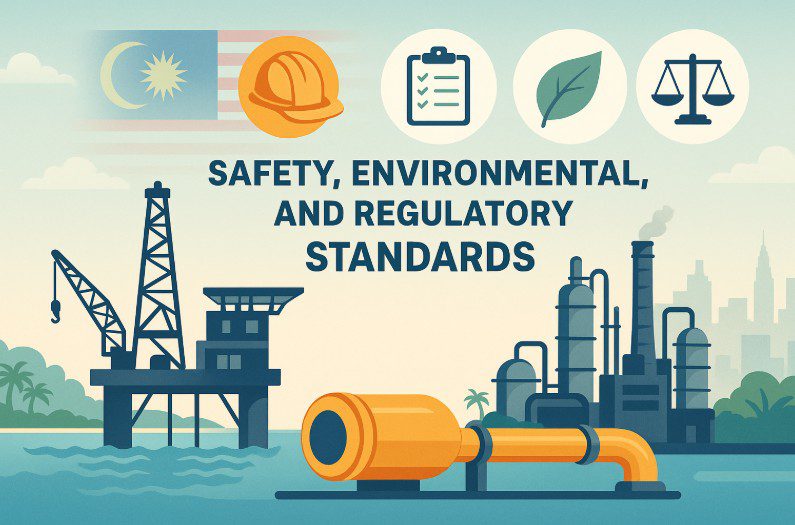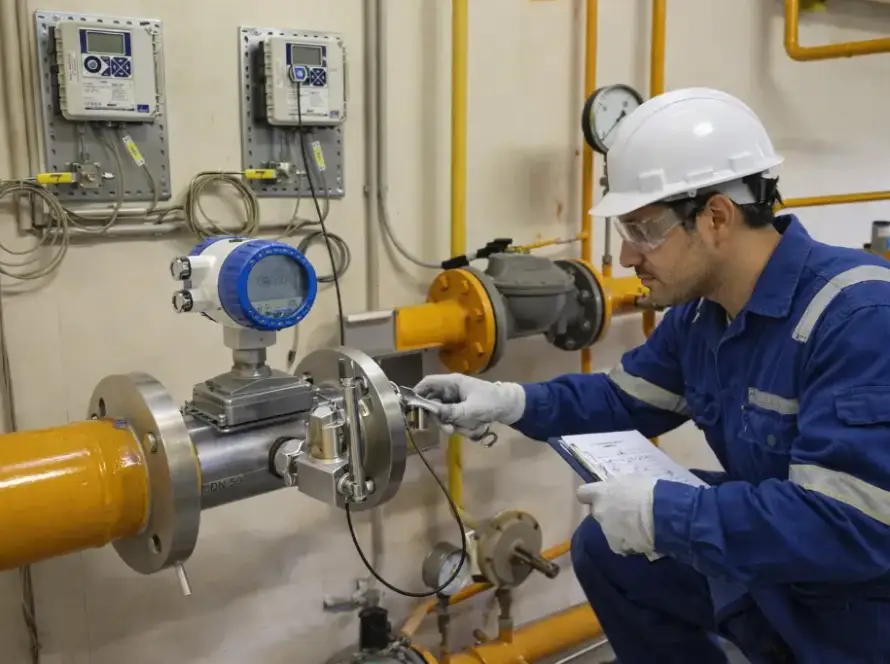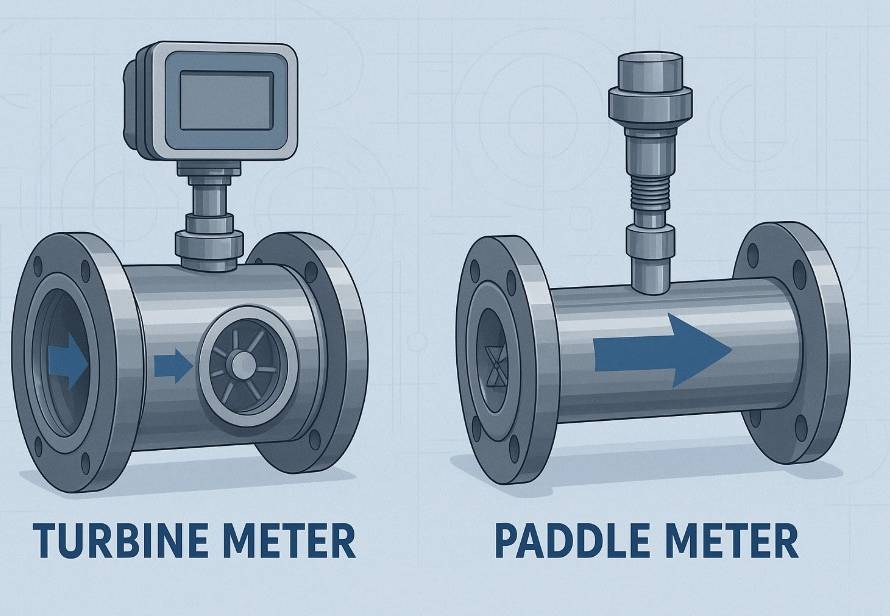A Guide to Safety, Environmental, and Regulatory Standards for Malaysian Oil & Gas Operations

The oil & gas industry in Malaysia operates under rigorous safety, environmental and regulatory standards to protect workers, communities, and ecosystems.
From offshore platforms to refining plants, companies must comply with national laws and follow international best practices. This guide walks you through the key regulations, recent updates, and practical steps to maintain compliance in Malaysian oil & gas operations.
Why Regulatory Compliance Matters in Oil & Gas
- Ensures the health & safety of workers in high-risk environments (flammable materials, high pressures, remote offshore locations).
- Protects the environment — air quality, water pollution, marine ecosystems.
- Avoids legal penalties, shutdowns and reputational damage.
- Meets investor, community, and global ESG expectations.
Major Malaysian Laws & Regulations
Regulation | What It Covers | Important Highlights & Recent Updates |
Occupational Safety & Health Act 1994 (OSHA 1994), Amended Act A1648 (2022) | Governs workplace safety, health, risk assessment, safety committees, safety officers. | As of 1 June 2024, the amendments expanded employer obligations, required chemical health risk assessments, indoor air quality monitoring, noise exposure limits, plus mandatory safety & health committees at certain workplaces. |
Environmental Quality Act 1974 (EQA) | Regulates pollution, discharges, emissions, waste, environmental impact assessments. | Offers licensing, penalties for pollution, requirements for Environmental Impact Assessments (EIA) for large scale or sensitive oil & gas projects. EQA supports regulations like Clean Air Regulations, scheduled waste management, effluent discharge rules. |
Best Available Techniques (BAT) Guidance Document for Oil & Gas Industry | Provides technical guidelines on how to prevent or minimize environmental impact with economically achievable technologies. | Includes guidance on air emissions, effluent treatment, fugitive emissions, monitoring, and energy efficiency. Helps companies comply with Clean Air Regulations and meet DOE expectations. |
Specific OSHA Regulations & Codes | E.g. Plants Requiring Qualification Certificates (PUA‐99 2024), Noise Exposure Regulations, Notification of Accidents etc. | These set out specific duties: which equipment or workplaces must have certification, thresholds for noise exposures, procedures for incident reporting, safety committees and health officers. |
Role of Regulatory Bodies
- DOSH (Department of Occupational Safety & Health): Enforces OSHA, audits workplaces, issues fitness certificates, oversees health/safety committees.
- DOE (Department of Environment): Oversees environmental licences, enforce EQA, monitor emissions, approve EIAs, supervise waste management.
- PETRONAS / Malaysia Petroleum Management (MPM): For companies under petroleum agreements, PETRONAS sets “governing standards” that include safety & environmental compliance.
Key Safety & Environmental Requirements
Safety Requirements
- Conduct risk assessments (including chemical, physical, health & environmental hazards).
- Establish safety and health committees in workplaces meeting thresholds. JKP Portal
- Appoint competent safety & health officers.
- Monitoring and controlling noise exposure, hazardous chemical exposure, indoor air quality.
- Incident notification & emergency response planning.
Environmental Requirements
- Use BAT (Best Available Techniques) to minimize emissions and manage pollutants.
- Comply with air quality standards and Clean Air Regulations.
- Proper treatment of effluent / wastewater from operations.
- Manage scheduled waste in accordance with EQA guidelines.
- Obtain Environmental Impact Assessments (EIAs) for prescribed activities (e.g. offshore field development, long pipelines etc.)
Recent/Important Updates to Know
- OSHA Amendment Act A1648 (2022) came into force on 1 June 2024. Key changes include expanded scope of employer duties, new monitoring/testing requirements, risk assessments for chemicals.
- Enforcement of Plants Requiring Certificates of Fitness (PUA-99 2024) indicates that certain equipment or installations must be certified fit for use by qualified inspectors.
- Updated guidance from DOE under BAT documents to align with latest international and local technology/practice.
Challenges & Common Gaps
- Lack of technical capacity / cost constraints for smaller operators.
- Ensuring contractors and subcontractors comply fully.
- Staying current: regulations, guidance documents, monitoring thresholds change.
- Enforcement inconsistency: remote/offshore operations may have weaker oversight.
Practical Tips for Ensuring Compliance
- Conduct regular internal audits and third-party inspections.
- Invest in training & competence: safety officers, environmental engineers.
- Use technology for monitoring (air, noise, chemical exposure, water discharge).
- Maintain good documentation: risk assessments, incident logs, certificates.
- Engage with regulators early (e.g., EIA screening, licences).
- Benchmark against international best practice and BAT guidance to reduce pollution, improve efficiency.
Frequently Asked Questions (FAQ)
What are the main safety laws for oil and gas operations in Malaysia?
The primary law is the Occupational Safety and Health Act 1994 (OSHA), which was amended in 2022 and enforced in June 2024. It sets out employer obligations for risk assessments, safety committees, competent officers, and reporting of workplace incidents.
Which environmental regulations apply to oil and gas companies in Malaysia?
The Environmental Quality Act 1974 (EQA) governs air emissions, wastewater discharge, scheduled waste, and pollution control. The Department of Environment (DOE) also enforces Clean Air Regulations, Industrial Effluent Regulations, and requires Environmental Impact Assessments (EIAs) for prescribed activities.
Who enforces oil and gas safety and environmental standards in Malaysia?
- DOSH (Department of Occupational Safety & Health) enforces workplace safety and health rules under OSHA.
- DOE (Department of Environment) enforces environmental laws under the EQA.
- PETRONAS / Malaysia Petroleum Management (MPM) issues governing standards for companies under petroleum agreements.
What recent changes should oil and gas companies know about?
Key updates include the OSHA Amendment Act A1648 (2022) effective from 1 June 2024, requiring expanded employer obligations, mandatory risk assessments, chemical health risk assessments, and stricter penalties. New DOE guidelines also emphasise Best Available Techniques (BAT) for pollution prevention.
What happens if a company fails to comply with oil and gas safety regulations?
Non-compliance can result in heavy fines, suspension of operations, legal liability, or imprisonment for responsible parties. Beyond legal consequences, it can damage corporate reputation, reduce investor confidence, and impact community trust.
How can oil and gas companies improve compliance in Malaysia?
- Appoint qualified safety and environmental officers.
- Conduct regular audits and inspections.
- Train workers on safety and emergency procedures.
- Implement Best Available Techniques (BAT) for pollution control.
- Keep documentation and licences up to date.
- Engage regulators early during project planning.
Conclusion
Compliance with Malaysia’s safety, environmental, and regulatory standards in the oil & gas sector is essential — not just for obeying the law, but for safeguarding lives, protecting the environment, and securing a sustainable business.
With the recent OSHA amendments and evolving environmental guidance, staying updated and proactive is more important than ever.
Disclaimer
This article is for informational purposes only and does not constitute legal or professional advice. For specific guidance, please consult relevant Malaysian regulatory authorities or qualified experts.



